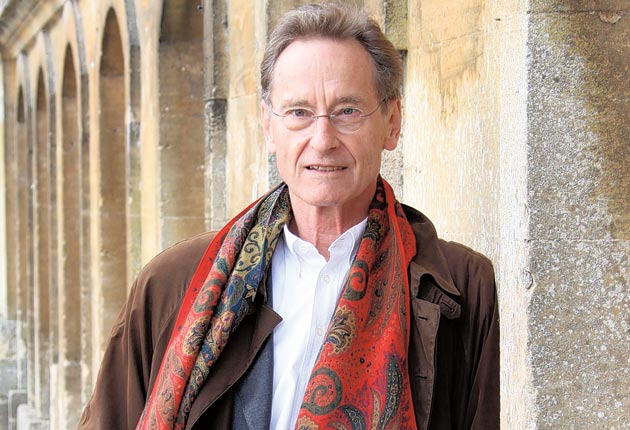Germany has yet to rid itself of its guilt over the Nazis, says Schlink

Your support helps us to tell the story
From reproductive rights to climate change to Big Tech, The Independent is on the ground when the story is developing. Whether it's investigating the financials of Elon Musk's pro-Trump PAC or producing our latest documentary, 'The A Word', which shines a light on the American women fighting for reproductive rights, we know how important it is to parse out the facts from the messaging.
At such a critical moment in US history, we need reporters on the ground. Your donation allows us to keep sending journalists to speak to both sides of the story.
The Independent is trusted by Americans across the entire political spectrum. And unlike many other quality news outlets, we choose not to lock Americans out of our reporting and analysis with paywalls. We believe quality journalism should be available to everyone, paid for by those who can afford it.
Your support makes all the difference.Bernhard Schlink, the best-selling author of The Reader, a post-Nazi era novel adapted into a film starring Kate Winslet, yesterday spoke about the extent of "collective guilt" which survives to this day among generations of Germans because of the atrocities of the Third Reich.
Contemporary Germany is not entirely free of this "second guilt" felt by younger generations for the "sins of their fathers", said Professor Schlink, who teaches law at Humboldt University. He appeared in front of a packed audience at The Independent Woodstock Literary Festival, where he spoke on issues featured in his new collection of essays, Guilt About the Past.
In one of three public appearances in Britain, Professor Schlink, who was born a year before the end of the Second World War, said it was in the 1960s when the German public first began to reflect openly and intensively on Nazi crimes and their own moral culpability during the regime.
"When I grew up, I found there was a sense of guilt even among those who had not committed any crime," he said. "In my generation, there is a strong sense of guilt too. I got the idea to look at collective guilt from research into tribal communities. If one member of a tribe commits a crime, they have the option to expel the person who committed the crime, or maintain some solidarity with the perpetrator, which then entangles them morally, and leads to guilt.
"If one cannot expel a parent or an uncle whom one loves, who turns out to have been involved with the Third Reich in a very bad way, this is what creates the 'second guilt'," he added. "There is a collective guilt that is created by not expelling such perpetrators."
He remembered a talented English teacher whom he greatly admired but who was discovered to have played a substantial role in the Third Reich. He felt a debt to him, he said, while knowing he had colluded in Nazi atrocities. "I owe him my love of the language," he recalled. "He was a wonderful teacher and at the same time, he did something truly bad."
When asked by the debate's chair, Boyd Tonkin, The Independent's literary editor, whether modern-day Germany had a clear conscience, he said it still had some way to go, although his university students did not feel culpability. "I think we are approaching this guilt-free period but we are not yet there," he answered. "Talking to my students, I realise they don't have any sense of guilt any more, although this doesn't mean they are not interested in the past any more. They travel abroad, they go to Israel, and they are often approached as Germans being asked difficult questions."
While Germany's Nazi history is firmly entrenched in the national school syllabus, it has its "own kinds of problems", he added. "Again and again, students say: 'I've heard this enough. I don't want to hear about it any more.' They spend six months learning about other periods of history, and two years on the Weimar Republic and Third Reich," he said. Professor Schlink also spoke about the suffering of German civilians and the complicated relationship that various members of Adolf Hitler's society had towards Nazism.
At a recent event, a half-German woman whose mother had been a member of Hitler Youth had talked about her guilt even though she described her mother's experience as a positive one. "Her mother was part of the Hitler Youth and then, it must have been quite something for women have a chance to get out of the house," he said.
"I have met women who were between the ages of 11 and 17, who say they had the time of their life. We have to understand why they liked it. And still understand it was bad. One has to live with this tension."
His novel, The Reader, featured as its central character an illiterate former SS female prison guard on trial for war crimes and the book earned him an international audience of millions.
What's on when at Woodstock
Today
The Ashes: Marcus Berkmann and Angus Fraser, Chaired by Brian Viner 9:30am
Nicholas Janni: Transformational Leadership – Lessons from Shakespeare's 'The Tempest' 10am
Dame Ann Leslie 12pm
Michael Frayn: My Father's Fortune 12pm
Tim Butcher: Chasing the Devil – The Search for Africa's Fighting Spirits 2pm
Andrew O'Hagan talks to Sarah Crompton 4:30pm
Political Scandals and Conspiracies: David Aaronovitch, Kevin Maguire and Paul Staines, Chaired by Ann Leslie 5pm
Edmund de Waal 7pm
Sunday
Dom Joly: The Dark Tourist: Sightseeing in the World's Most Unlikely Holiday Destinations 12:30pm
Daisy Goodwin talks to Simon Kelner 11am
Did the last Election change British Politics Forever?: Peter Hennessy, Steve Richards and Polly Toynbee, Chaired by Mary Ann Sieghart 11am
Lady Antonia Fraser talks to James Walton 12:30pm
Colin Dexter 2pm
For further details see: http://www.woodstockliteraryfestival.com
Join our commenting forum
Join thought-provoking conversations, follow other Independent readers and see their replies
Comments